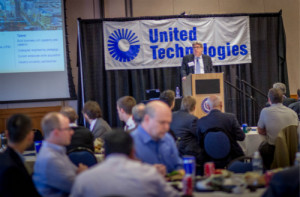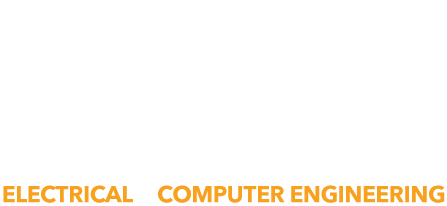International Conference on Complex Systems Engineering (ICCSE 2015) Held in UConn
The University of Connecticut (UCONN) organized a two-day international conference on complex systems engineering (ICCSE 2015) on November 9-10, 2015 at the UConn’s main campus in Storrs, CT. The conference organization committee was led by Dr. Krishna Pattipati as the general chair and Dr. Shalabh Gupta as the program chair. The conference was focused on latest developments in analysis and modeling of complex systems that are built from, and depend upon, the synergy of computational and physical components, the so-called cyber physical systems. The conference featured talks by plenary speakers from industry and academia, panel discussions, technical paper sessions, student poster sessions and industry exhibits. The conference was a 2nd year initiative by the recently established UTC Institute for Advanced Systems Engineering (UTC-IASE). The conference was financially co-sponsored by UTC and Aptima and technically sponsored by IEEE-Systems Man and Cybernetics Society. The conference served one of the institute’s goals of making it a hub for world-class research, project-based learning by globally-distributed teams of researchers, and industrial outreach activities.
There were four plenary speakers, viz., Dr. Michael McQuade (Senior Vice President of Science and Technology at UTC), Dr. Edward Lee (Robert S. Pepper Distinguished Professor in the Electrical Engineering and Computer Sciences (EECS) department at U.C. Berkeley), Dr. George Pappas (Joseph Moore Professor in the Department of Electrical and Systems Engineering at the University of Pennsylvania), and Dr. Chris Paredis (Program Director for the Engineering and Systems Design (ESD) and Systems Science (SYS) programs at the National Science Foundation). Dr. Michael McQuade outlined the mega-trends that are impacting systems engineering and highlighted technology and talent needs of the industry and more specifically of UTC. Dr. Edward Lee provided an overview of the need for models with time and concurrency requirements, model-based design and analysis, domain-specific languages, architectures for real-time computing, schedulability analysis, and modeling and programming of distributed real-time systems. Dr. George Pappas gave a talk on formal synthesis and analysis for supervisory control of hierarchical hybrid systems using linear temporal logic. Dr. Chris Paredis spoke about the theoretical foundations for Systems Engineering, the role of modeling in Systems Engineering and gave the audience a glimpse of opportunities for research in Systems Engineering and model based systems engineering (MBSE) being sponsored by NSF.
In addition to the plenary speakers, many representatives from industry and academia presented their latest research along three tracks of embedded systems, complex networked systems: control and inference, and model based systems engineering and applications. There was an education panel where educators from UConn, Stevens Institute of Technology, and Worcester Polytechnic Institute and UTC exchanged lessons learned and discussed the standardization of Systems Engineering education. The conference was truly international with representation from Asia, Europe and North America. More than 80 people participated in the conference which led to a healthy exchange of ideas. Planning for next year’s conference on the Avery Point campus of the University of Connecticut is already underway.
Categories: News
Published: November 18, 2015
Available Archives

